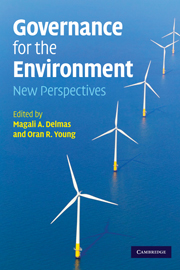Book contents
- Frontmatter
- Contents
- List of figures
- List of tables
- List of contributors
- Preface
- PART I Central threads and analytic perspectives
- PART II Governance for solving environmental problems: perspectives from economics, political science, and management
- 2 Environmental governance: an economic perspective
- 3 Environmental governance and political science
- 4 Self-regulatory institutions for solving environmental problems: perspectives and contributions from the management literature
- PART III The effectiveness of governance for sustainable development
- PART IV Conclusion
- References
- Index
2 - Environmental governance: an economic perspective
Published online by Cambridge University Press: 05 June 2012
- Frontmatter
- Contents
- List of figures
- List of tables
- List of contributors
- Preface
- PART I Central threads and analytic perspectives
- PART II Governance for solving environmental problems: perspectives from economics, political science, and management
- 2 Environmental governance: an economic perspective
- 3 Environmental governance and political science
- 4 Self-regulatory institutions for solving environmental problems: perspectives and contributions from the management literature
- PART III The effectiveness of governance for sustainable development
- PART IV Conclusion
- References
- Index
Summary
Introduction
From an economic perspective, it is natural to think of the “demand for” and “supply of” environmental governance. The demand for governance comes from individuals concerned about the quality of the environment. They may express this demand in their roles as citizens, consumers, investors, or members of nongovernmental organizations (NGOS). The supply of governance is generally thought of as coming from government in the form of legislation and regulation, outcomes of the political process. However, as pointed out in Chapter 1, it may also come from direct negotiations between NGOS and corporations, a process sometimes referred to as “private politics.” In addition, environmental governance may come about through the workings of the marketplace, as consumers demand environmentally friendly products or investors show a preference for environmentally friendly companies. Some of the most intriguing forms of modern environmental governance result from the interplay of all three of these processes, as will be illustrated throughout the course of this volume.
The conventional wisdom of neoclassical economics had little to say about environmental governance. “Externalities” arose when market transactions affected third parties and led to “market failure.” It was the job of government to “internalize the externalities” through the imposition of Pigouvian taxes set equal to marginal external costs. Although this may have been a reasonable prescription for a Platonic philosopher king, it completely obscured the processes by which governance might be achieved in the absence of such a convenient being.
As in many fields of economics, the seeds of a new perspective on environmental governance were sown by Ronald Coase.
- Type
- Chapter
- Information
- Governance for the EnvironmentNew Perspectives, pp. 43 - 68Publisher: Cambridge University PressPrint publication year: 2009
- 5
- Cited by

